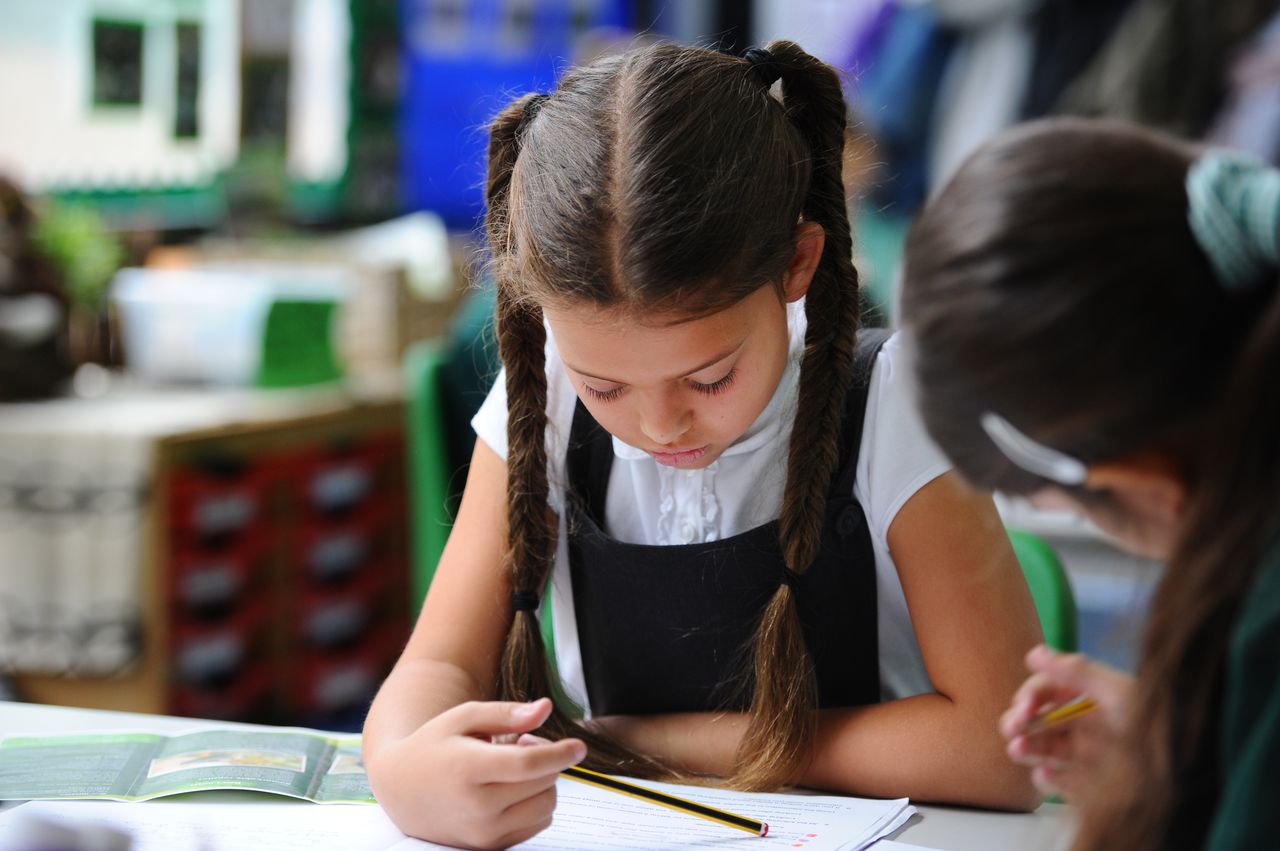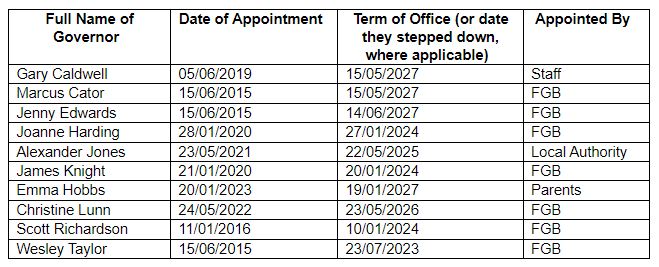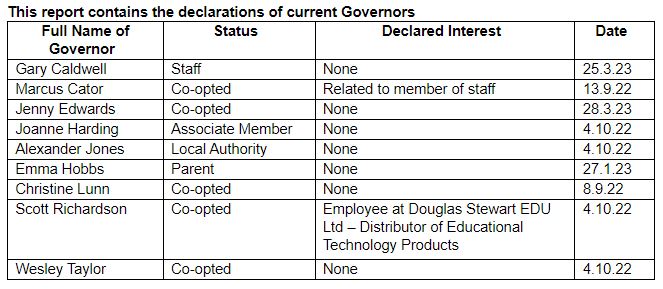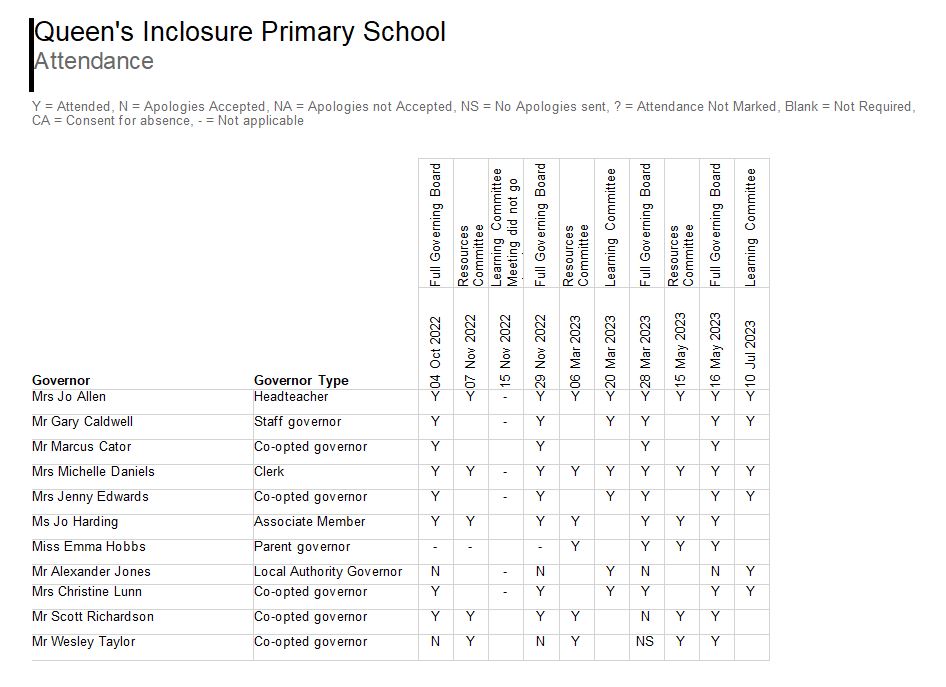Governors
Instrument of Government
Who's Who....
Scott Richardson - Chair of Governors and Resources Committee Chair (Co-opted)
Michelle Daniels - Clerk to the Governors
Mr Gary Caldwell - Learning Committee (Staff)
Mr Oliver Dockerill - Resources Committee (Parent)
Mrs Jenny Edwards - Learning Committee & SEN Governor (Co-opted)
Ms Joanne Harding (Associate Member)
Mrs Emma Hobbs - Resources Committee (Parent)
Mrs Christine Lunn - Learning Committee (Co-opted)
Mrs Allen - Resources & Learning Committees (Ex Officio Governor)
About School Governors incl Roles and Responsibilities
Background
School governors are one of the country's largest voluntary groups with around 300,000 contributing to strategic development and raising standards of achievement at more than 30,000 schools.
School governors are members of their school's governing body, which is known as a 'corporate body'. A corporate body has a legal identity that is separate from its members and as a result, individual governors are generally protected from personal liability as a result of the governing body's decisions and actions provided they act honestly, reasonably and in good faith.
Individual governors have no power or right to act on behalf of the governing body except where the whole governing body has delegated a specific function to that individual or where regulations specify a function is to be exercised in a particular way.
School governors are drawn from different parts of the community and can be parents and staff or from the LA, the community and other groups. This helps ensure the governing body has sufficient diversity of views and experience but does not mean governors of a particular category represent that group on the governing body. For example, parent governors do not represent the parents at the school and do not report back to them.
Responsibilities
The governing body has a range of duties and powers and a general responsibility for the conduct of the school with a view to promoting high standards of educational achievement. Its responsibilities include but are not limited to:
- setting targets for pupil achievement
- managing the school's finances
- making sure the curriculum is balanced and broadly based
- appointing staff
- reviewing staff performance and pay.
The governing body has considerable discretion as to how to discharge its responsibilities but is required to constitute itself in line with the regulations and to appoint a chair and vice chair. The governing body may delegate certain of its responsibilities to certain governors or committees of governors, although in general, it is not compelled to do so.
Roles and actions
There are a range of roles and actions the governing body or individual governors need to consider:
- Constitution of the governing body – the governing body must be constituted in line with the School Governance (Constitution) (England) Regulations 2003. These regulations cover the number and type (category) of governors that make up the governing body.
- Terms of reference of the governing body – more information can be found on this website about the different categories, roles and committees that can be involved with being a governor. In brief, the different categories are:
- parent governors: selected by election (or appointment if insufficient people stand for election) and drawn from parents and carers of children at the school
- staff governors: selected by election from teaching and support staff paid to work at the school
- community governors: appointed by the governing body to represent community interests
- authority governors: appointed by the local authority
- foundation governors (not community schools): appointed by the school's founding body, church or other organisation named in the school's instrument of government
- partnership governors (foundation schools only): replace foundation governors if the school does not have a founding body
- sponsor governors: discretionary category appointed by the governing body from individuals who have made significant (financial) contributions to the school
- associate members (not governors): appointed by the governing body to attend committee meetings and/or full governing body meetings due to their particular skills or experience.
- Roles of governor – the governing body must appoint a chair and vice-chair and may wish to make a number of other specific appointments to lead on certain aspects of the school.
- Committees of the governing body – the governing body can delegate certain of its responsibilities to committees or individual governors.
The role of the governing body chair (and vice chair in the chair's absence) can include the following:
- to maintain the governing body's focus on school improvement and performance
- to ensure affairs are conducted according to the law
- to report any urgent action taken on behalf of the governing body, making sure it is fully explained and supported.
Chairs cannot take decisions on behalf of governors unless there has been a resolution of the whole governing body to delegate a specific authority. However, they are able to take action if the matter is urgent.
The School Government (Procedures) (England) Regulations 2003 Regulation 6 defines 'urgent' as a case where the circumstances are that a delay in exercising the function would be likely to be seriously detrimental to the interests of the school; any pupil at the school, or his parent; or a person who works at the school and where it would not be reasonably practicable to hold a governors' meeting to resolve the issue.
Any urgent action the chair or vice chair takes on behalf of the governing body should be reported at the next meeting.
The chair of governors is responsible for making sure that:
- the year's cycle of meetings are planned, with a timetable drawn up for action and reports
- meetings are well run and minuted correctly, and decisions taken as necessary
- all governors understand their collective responsibility for any decisions
- the governors work as a team, and everyone understands each other's roles and the roles of other professionals within the school
- objectives are clarified, and committees created to work out and put into practice areas of planning
The chair works closely with the headteacher, listening to concerns, offering advice and talking through disagreements before governing body meetings.
They carry out duties delegated by the governing body, attend school functions or make sure another governor represents them, and are accessible to other governors, staff and parents. Chairs of governors also work with the local authority and meet governors from other schools.
Pecuniary Interest and Meeting Attendance
Record of Pecuniary Interest 2022/23
Record of Attendance for 2022/23
The Governing Body are always keen to receive feedback about the school and can be contacted directly by emailing governors@queensinclosure.hants.sch.uk. They will not, however, look into complaints that have not been addressed to the Headteacher in the first instance. Any such issues received by governors will be passed to Mrs Allen.












